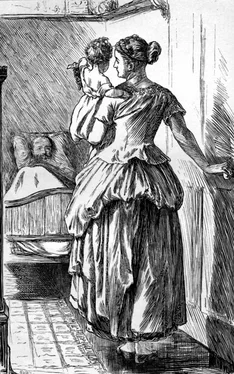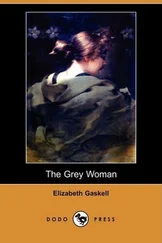"But Thekla told me the vintage was not till the fourteenth; and you have a vineyard close beyond the garden on the slope of the hill out there, have you not?"
"Yes; and grapes for the gathering. But perhaps the gentleman does not know our laws. Until the vintage—(the day of beginning the vintage is fixed by the Grand Duke, and advertised in the public papers)—until the vintage, all owners of vineyards may only go on two appointed days in every week to gather their grapes; on those two days (Tuesdays and Fridays this year) they must gather enough for the wants of their families; and if they do not reckon rightly, and gather short measure, why they have to go without. And these two last days the Half-Moon has been besieged with visitors, all of whom have asked for grapes. But to-morrow the gentleman can have as many as he will; it is the day for gathering them."
"What a strange kind of paternal law," I grumbled out. "Why is it so ordained? Is it to secure the owners against pilfering from their unfenced vineyards?"
"I am sure I cannot tell," she replied. "Country people in these villages have strange customs in many ways, as I daresay the English gentleman has perceived. If he would come to Worms he would see a different kind of life."
"But not a view like this," I replied, caught by a sudden change of light—some cloud passing away from the sun, or something. Right outside of the windows was, as I have so often said, the garden. Trained plum-trees with golden leaves, great bushes of purple, Michaelmas daisy, late flowering roses, apple-trees partly stripped of their rosy fruit, but still with enough left on their boughs to require the props set to support the luxuriant burden; to the left an arbour covered over with honeysuckle and other sweet-smelling creepers—all bounded by a low gray stone wall which opened out upon the steep vineyard, that stretched up the hill beyond, one hill of a series rising higher and higher into the purple distance. "Why is there a rope with a bunch of straw tied in it stretched across the opening of the garden into the vineyard?" I inquired, as my eye suddenly caught upon the object.
"It is the country way of showing that no one must pass along that path. To-morrow the gentleman will see it removed; and then he shall have the grapes. Now I will go and prepare his coffee." With a curtsey, after the fashion of Worms gentility, she withdrew. But an under-servant brought me my coffee; and with her I could not exchange a word: she spoke in such an execrable patois. I went to bed early, weary, and depressed. I must have fallen asleep immediately, for I never heard any one come to arrange my bed-side table; yet in the morning I found that every usual want or wish of mine had been attended to.

I was wakened by a tap at my door, and a pretty piping child's voice asking, in broken German, to come in. On giving the usual permission, Thekla entered, carrying a great lovely boy of two years old, or thereabouts, who had only his little night-shirt on, and was all flushed with sleep. He held tight in his hands a great cluster of muscatel and noble grapes. He seemed like a little Bacchus, as she carried him towards me with an expression of pretty loving pride upon her face as she looked at him. But when he came close to me—the grim, wasted, unshorn—he turned quick away, and hid his face in her neck, still grasping tight his bunch of grapes. She spoke to him rapidly and softly, coaxing him as I could tell full well, although I could not follow her words; and in a minute or two the little fellow obeyed her, and turned and stretched himself almost to overbalancing out of her arms, and half-dropped the fruit on the bed by me. Then he clutched at her again, burying his face in her kerchief, and fastening his little fists in her luxuriant hair.
"It is my master's only boy," said she, disentangling his fingers with quiet patience, only to have them grasp her braids afresh. "He is my little Max, my heart's delight, only he must not pull so hard. Say his 'to-meet-again, and kiss his hand lovingly, and we will go." The promise of a speedy departure from my dusky room proved irresistible; he babbled out his Aufwiedersehen, and kissing his chubby hand, he was borne away joyful and chattering fast in his infantile half-language. I did not see Thekla again until late afternoon, when she brought me in my coffee. She was not like the same creature as the blooming, cheerful maiden whom I had seen in the morning; she looked wan and careworn, older by several years.
"What is the matter, Thekla?" said I, with true anxiety as to what might have befallen my good, faithful nurse.
She looked round before answering. "I have seen him," she said. "He has been here, and the Fräulein has been so angry! She says she will tell my master. Oh, it has been such a day!" The poor young woman, who was usually so composed and self-restrained, was on the point of bursting into tears; but by a strong effort she checked herself, and tried to busy herself with rearranging the white china cup, so as to place it more conveniently to my hand.
"Come, Thekla," said I, "tell me all about it. I have heard loud voices talking, and I fancied something had put the Fräulein out; and Lottchen looked flurried when she brought me my dinner. Is Franz here? How has he found you out?"
"He is here. Yes, I am sure it is he; but four years makes such a difference in a man; his whole look and manner seemed so strange to me; but he knew me at once, and called me all the old names which we used to call each other when we were children; and he must needs tell me how it had come to pass that he had not married that Swiss Anna. He said he had never loved her; and that now he was going home to settle, and he hoped that I would come too, and—" There she stopped short.
"And marry him, and live at the inn at Altenahr," said I, smiling, to reassure her, though I felt rather disappointed about the whole affair.
"No," she replied. "Old Weber, his father, is dead; he died in debt, and Franz will have no money. And he was always one that needed money. Some are, you know; and while I was thinking, and he was standing near me, the Fräulein came in; and—and—I don't wonder—for poor Franz is not a pleasant-looking man now-a-days—she was very angry, and called me a bold, bad girl, and said she could have no such goings on at the 'Halbmond, but would tell my master when he came home from the forest."
"But you could have told her that you were old friends." I hesitated, before saying the word lovers, but, after a pause, out it came.
"Franz might have said so," she replied, a little stiffly. "I could not; but he went off as soon as she bade him. He went to the 'Adler' over the way, only saying he would come for my answer to-morrow morning. I think it was he that should have told her what we were—neighbours' children and early friends—not have left it all to me. Oh," said she, clasping her hands tight together, "she will make such a story of it to my master."
"Never mind," said I, "tell the master I want to see him, as soon as he comes in from the forest, and trust me to set him right before the Fräulein has the chance to set him wrong."
She looked up at me gratefully, and went away without any more words. Presently the fine burly figure of my host stood at the opening to my enclosed sitting-room. He was there, three-cornered hat in hand, looking tired and heated as a man does after a hard day's work, but as kindly and genial as ever, which is not what every man is who is called to business after such a day, before he has had the necessary food and rest.
I had been reflecting a good deal on Thekla's story; I could not quite interpret her manner to-day to my full satisfaction; but yet the love which had grown with her growth, must assuredly have been called forth by her lover's sudden reappearance; and I was inclined to give him some credit for having broken off an engagement to Swiss Anna, which had promised so many worldly advantages; and, again, I had considered that if he was a little weak and sentimental, it was Thekla, who would marry him by her own free will, and perhaps she had sense and quiet resolution enough for both. So I gave the heads of the little history I have told you to my good friend and host, adding that I should like to have a man's opinion of this man; but that if he were not an absolute good-for-nothing, and if Thekla still loved him, as I believed, I would try and advance them the requisite money towards establishing themselves in the hereditary inn at Altenahr.
Читать дальше













